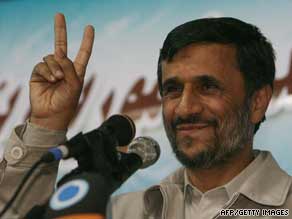Ahmadinejad will sink or swim on public appeal of his stubborn zeal
- Story Highlights
- Iran's President Mahmoud Ahmadinejad known for hostility toward U.S., Israel
- Incumbent in tight race to win second four-year term as president
- Ahmadinejad has defied IAEA over inspections of nuclear facilities
- Some voters think less belligerent foreign policy would help economy, writer says
CNN
(CNN) -- Americans know Iranian President Mahmoud Ahmadinejad for his belligerence toward the United States and Israel and for clashes with international regulators over Iran's pursuit of nuclear technology.

President Mahmoud Ahmadinejad's foreign policy has affected Iran's domestic economy.
The conservative Ahmadinejad, 52, the former mayor of Tehran, was elected president in a landslide in June 2005, defeating centrist Ayatollah Akbar Hashemi Rafsanjani. A tighter race is expected in this Friday's presidential contest, which pits Ahmadinejad against self-described reformist Mir Hossein Moussavi and two other candidates.
Ahmadinejad is expected by many to be re-elected.
"He's pretty charming. He's a little bullheaded, but he's definitely got his charms and charisma in a strange sort of way," said Hooman Majd, an Iranian-American writer who travels to Iran several times a year.
Ahmadinejad and his wife, Parvin, have three children. Rumors that he was among the revolutionaries who held hostages at the American Embassy in Tehran from 1979 to 1981 have never been confirmed.
"He's an interesting man," Majd said. "He's very smart. There's no question about that." ![]() Watch the intensity of the campaign »
Watch the intensity of the campaign »
A few months after taking office, Ahmadinejad stated during a speech at the World Without Zionism conference in Tehran that "Israel must be wiped off the map." In another speech two months later, he referred to the Holocaust as "a myth" started by Europeans.
Don't Miss
Last week at the site of the Buchenwald concentration camp in Germany, President Obama didn't mention Ahmadinejad by name but denounced "those who insist that the Holocaust never happened -- a denial of fact and truth that is baseless and ignorant and hateful."
Ahmadinejad, the son of a blacksmith and holder of a doctorate in transportation engineering, enjoys strong support among the lower classes and in smaller cities, where he has liberally disbursed government money, said Mehdi Khalaji, a senior fellow at the Washington Institute for Near East Policy. He also appeals to poorly educated people who are most influenced by religious hard-liners, Khalaji said.
"Honestly, we've never seen anyone as courageous as Ahmadinejad," one man said at a Tehran rally this week.
"He is a true son of the Revolution," said another.
The president's revolutionary fervor is genuine, Majd said, and it is his political bread and butter.
"There are people who support that, who like the idea of Iran maintaining that revolutionary zeal and being that revolutionary state," Majd said.
However, even some of Ahmadinejad's supporters acknowledge that voters may be looking for a change.
"Most of the people voting for Moussavi are doing it just to get rid of Ahmadinejad," one woman in Tehran said. ![]() Watch what some of the key issues are »
Watch what some of the key issues are »
Many want Iran to have better relations with the West, relations that have been strained by Ahmadinejad's remarks about Israel and his refusal to submit to inspections of nuclear facilities by the International Atomic Energy Agency.
That stance has led to isolation from the West, hampering foreign investment and limiting Iran's economic growth, a sore point with many voters.
"There's a sort of overwhelming support now for an opening up of the country to the international community and some access to the free-market economy because, frankly, Iran's own economy is on the verge of utter collapse," said Reza Aslan, an analyst for DailyBeast.com and author of the book "No God But God," an analysis of Islam in politics and culture.
Majd, who has translated for Ahmadinejad at the United Nations and who spent four of the last six weeks in Tehran, agreed.
"A less belligerent foreign policy, a slight, strategic alteration of the foreign policy, is going to bode well for Iran. That's how a lot of voters are viewing it," he said.

The success or failure of Obama's diplomatic overtures toward Iran could hinge on Friday's election, Aslan said.
"Let's be frank. The Obama administration is going to open up to Iran regardless of who wins this election," Aslan said. "But it would certainly be a lot easier, not to mention more politically palatable in the United States, if it weren't Ahmadinejad."
CNN chief international correspondent Christiane Amanpour contributed to this report.
All About Mahmoud Ahmadinejad • Iranian Politics • International Relations • Nuclear Proliferation

 Sit tight, we're getting to the good stuff
Sit tight, we're getting to the good stuff